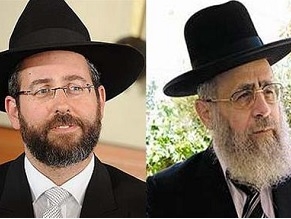|
World Jewish News

American Jewish groups called on Ashkenazi Chief Rabbi-elect David Lau (left) and his Sephardi counterpart Yitzchak Yosef to transform the office “into one of moral influence rather than coercive power” following their election Wednesday
|
Netanyahu congratulates chief rabbis-elect, calls for unity as Israel opts for pedigree over Zionism
26.07.2013, Israel Israeli Premier Benjamin Netanyahu greeted the victors of this week’s closely-fought Chief Rabbinate electoral ballot Wednesday, as he called on successful Sephardi candidate Rabbi Yitzchak Yosef and his Ashkenazi counterpart David Lau “to act to increase unity and love among the Jewish People”. Both candidates were elected to a standard ten-year mandate.
His chosen message of unity could not have been more apt in the aftermath of a religious selection protest that ran on largely political lines, with Lau, son of former Chief Rabbi Yisrael Meir Lau, being chosen despite much of the political mainstream championing his fellow candidate, the more moderate Rabbi David Stav. Right-wing Habayit Hayehudi chairman Naftali Bennett was an outspoken proponent of Stav’s candidacy, as part of his pledge to return “at least one Zionist rabbi” to the Chief Rabbinate, but his failed campaign to shake up the staunchly orthodox hierarchy also drew support from more centrist factions including Bennett’s key ally Yesh Atid, Tzipi Livni’s Hatnuah, Labor and Yisrael Beiteinu.
American Jewish groups, both religious and political, had similarly supported Stav’s bid for the rabbinate, with the Rabbinical Council of America and the Anti-Defamation League both speaking out in his favour. The American Jewish Committee (AJC) went a step further Wednesday as it reiterated its “long-standing concerns about the office of the Chief Rabbinate, its relevance to the State of Israel and world Jewry in the 21st century, and the urgent need for its reform”.
Arguing that the role of Chief Rabbi in the Jewish State should legitimately “function as the public face of Judaism”, the official comment expressed its regret that the opportunity to transform the office “into one of moral influence rather than coercive power” was not seized upon. Invoking issues of significant concern amongst Diaspora Jewry, such as conversion to Judaism, pluralism, the human right to marriage and the rights of women within Judaism, the AJC called on Lau and Yosef to provide the essential spiritual leadership in acknowledging “the importance of the relationship of Israel to world Jewry and urge that the newly-elected chief rabbis recognise the intense interest of world Jewry in the resolution of these questions”.
Yosef, son of ultra-Orthodox Shas party’s spiritual leader and former Sephardi Chief Rabbi Ovadia Yosef, similarly comes from the ultra-Orthodox sphere. His election, an apparent success for Shas, will go some way to placating the group which lost out heavily in the coalition wrangling which followed January’s inconclusive generals election result and allowed Habayit Hayehudi and Yesh Atid to negotiate the ultra-Orthodox party’s exit from the government in order to mobilise their plans to push through a controversial compulsory draft bill for the ultra-Orthodox, which Shas repeatedly opposed in the last administration. Shas’ success was further compounded by the election of Lau, whose candidacy Yosef Senior similarly championed even saying in recent weeks he loved him “as much as my sons”.
Lau is also thought to be a close ally of Netanyahu, who invited both rabbis to join the Tanakh (bible)study circle that he holds at his residence, and which is named after his late father-in-law Shmuel Ben-Artzim in the aftermath of their election. The secret ballot was made by an electoral assembly consisting of cabinet ministers, members of the Knesset (MKs), rabbis, mayors, religious court judges, heads of local religious councils and representatives of the general public.
by: Shari Ryness
EJP
|
|
